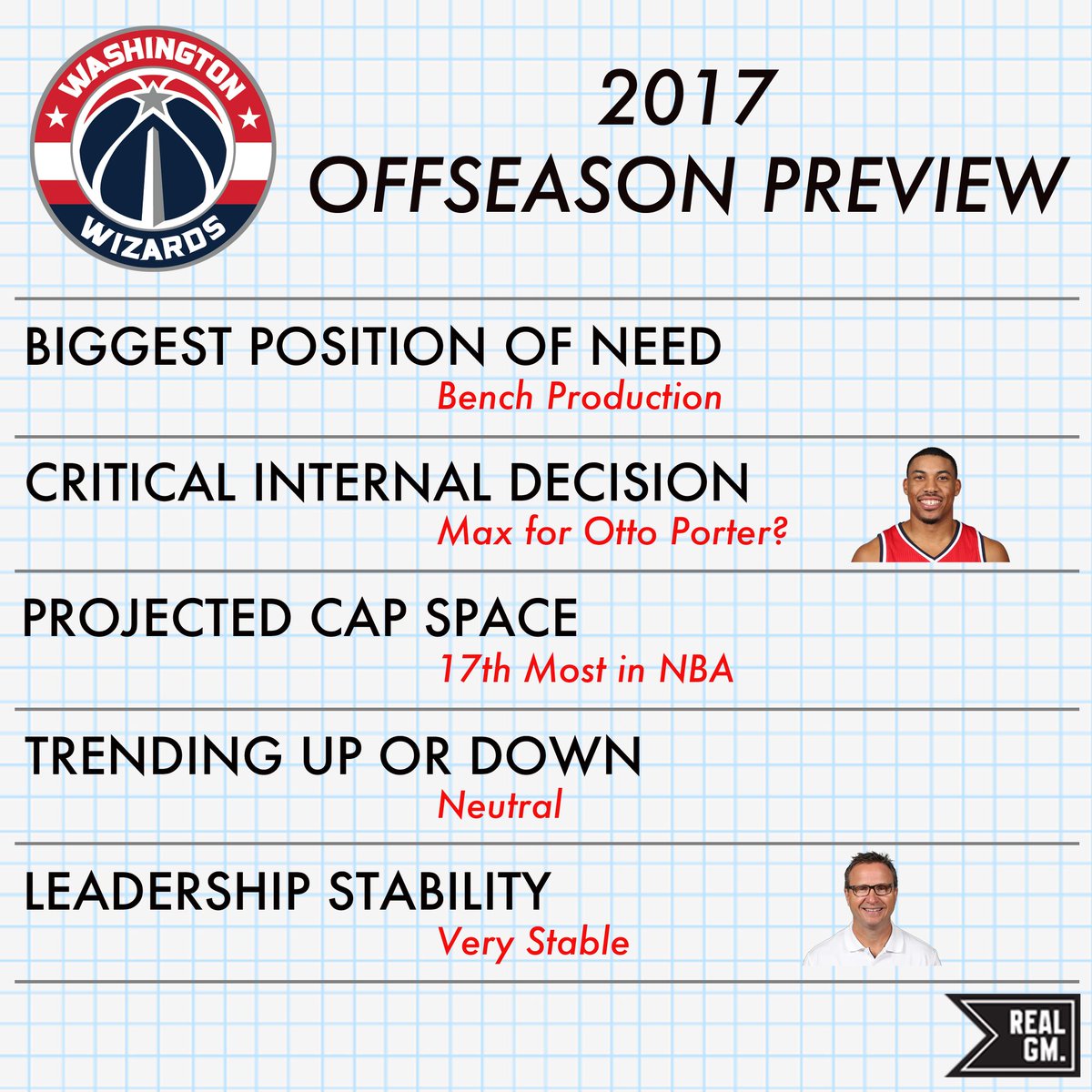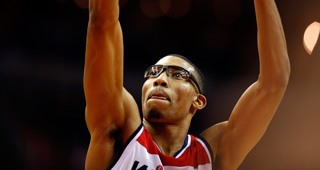The Washington Wizards have made the playoffs in three of the past four seasons, losing in the second round in each of those appearances. Each playoff appearance has been on the backs of the core group of John Wall, Bradley Beal, Marcin Gortat and Otto Porter. At the trade deadline in 2016, the Wizards added a fifth staple in starting power forward Markieff Morris. And prior to last season, Washington fired Randy Wittman and brought in Scott Brooks to push the team’s talented core forward, similar to what he had done in Oklahoma City.
Armed with a solid group to build around, a new coach and cap space, Washington hit last offseason poised to make a big leap. Lacking bench depth, the Wizards signed Ian Mahinmi, Jason Smith and Andrew Nicholson up front and traded for Trey Burke in the backcourt. The team also inked Tomas Satoransky, four years after drafting him in the second round in 2012. Unfortunately, the big cash outlay didn’t deliver as hoped, as the Wizards bench was among the worst in the NBA. Things got so bad at one point in the middle of the season that the starters began calling out the bench publicly.
With that in mind, General Manager Ernie Grunfeld made moves to solidify his reserve unit. The team added Brandon Jennings after he was waived by the Knicks and swung a deal at the trade deadline that sent Nicholson to Brooklyn for Bojan Bogdanovic. Jennings replaced Burke, who had failed to lock down the backup point guard minutes, and Bogdanovic gave the Wizards the bench scorer they had sorely lacked all year.
The result was a 49 win season, the most victories the franchise has had since 1978-79. The team then beat the Atlanta Hawks in the first round, before pushing the Boston Celtics to seven games in the second round. All-in-all, it was a successful season, but there's a sense this team can get to a higher level. When you have a talent like John Wall at the front of your attack, you expect more than a few second round playoff appearances.
Unfortunately for the Wizards, the means to improve the roster aren’t as evident as a year ago. After spending big on Mahinmi (three years and over $48 million left) and Smith (two years and $10.6 million left), in addition to signing Beal to a max contract, Washington is kind of stuck with what they have. Shedding the three years and nearly $20 million owed to Nicholson in the Bogdanovic trade was good work, but wasn’t nearly enough to create any sort of flexibility for the Wizards.
Washington already started on their offseason by swapping a second round pick, their lone selection in the 2017 NBA Draft, to New Orleans for backup point guard Tim Frazier. Frazier has proven solid in both a backup and spot starter role over the last two years behind Jrue Holiday with the Pelicans. He’ll be an upgrade over both Burke and Jennings, neither of whom are expected to be back. Burke is likely to be non-tendered a qualifying offer and allowed to become an unrestricted free agent, and Jennings will probably look for a bigger role with another playoff contender.
The Wizards' other big free agent decision is Bogdanovic. He was solid for Washington, scoring 12.7 points per game off the bench, while shooting 45.7 percent overall and 39.1 percent on three-pointers. His numbers dropped in the playoffs, as Brooks relied more on his starters, but Bogdanovic proved to be a worthy addition. Even if all the trade for him did was remove Nicholson’s long term money, it would have been valuable. His play on the court made it even more so. With Washington capped out, expect them to tender Bogdanovic a qualifying offer, so they can retain match rights on him as a restricted free agent. From there it will depend on what kind of offers he might get. As an experienced player on the international level and with back-to-back productive NBA seasons, Bogdanovic can help a lot of teams and may get a nice offer elsewhere.
Burke, Jennings and Bogdanovic all pale in comparison to the Wizards single biggest decision of the summer though. How much can they afford to pay Otto Porter? In his first four years, Porter has gone from questionable prospect who may have been drafted too high to indispensable member of the Wizards rotation. Porter averaged career-highs across the board, but blossomed most as a shooter. He shot 51.6 percent from the field and over 43 percent from behind the arc. His ability to knock down the corner-three was key to the Wizards offense, as he hit 42.3 percent from the corner and took 40 percent of his three pointers from the corner. Playing off penetration from Wall or off actions designed primarily for Beal, Porter was a more than capable third option.
Porter also improved his rebounding, lifting his rebound rate from 9.6 percent to over 11 percent. He also barely ever turned the ball over and boasted an Offensive Rating of 129. His three-point shooting dipped in the playoffs, but he made up for it by attacking the rim more and drawing almost double the free throw attempts per game as he had in the regular season. All around, Porter has become a player the Wizards can ill afford to lose.
Alas, the combination of Porter’s breakout and the Wizards lack of cap space puts Washington in a tough spot. They want to retain Porter, but are facing a potentially large luxury tax bill to do so. Washington is already paying Beal $23.7 million for next year, Wall just over $18 million, and the center combo of Gortat and Mahinmi a combined $29.4 million. Those four alone account for nearly ¾ of the cap.
With players who can shoot and reasonably play both forward spots in demand around the NBA, Porter is likely to get a max offer in free agency. Teams like Brooklyn, Miami, Philadelphia and Sacramento all have cap space and the need for a forward like Porter. Any of those three could put together a max offer sheet for Porter. At that point, Washington has to swallow hard and match it. They have no way of replacing him otherwise. That will make the Wizards a tax team for the first time, but there really isn’t another choice if they want to keep the forward momentum they built this past year.
Drafting, developing and retaining your own players, as the Wizards have done with Wall, Beal and possibly Porter, is the preferred method of team building. But it can get pricey, especially when you add highly paid talent around them that doesn’t always deliver. In that case it all comes down to something Washington knows all too well: taxes. In the case of the Wizards, the willingness to pay the tax will make the difference in continuing to be in the playoffs or back in the lottery.
Offseason Details
Guaranteed Contracts (10): Bradley Beal, Tim Frazier, Marcin Gortat, Ian Mahinmi, Chris McCullough, Markieff Morris, Kelly Oubre Jr., Tomas Satoransky, Jason Smith, John Wall
Partial/Non-Guaranteed Contracts (2): Sheldon McClellan, Daniel Ochefu
Potential Free Agents (4): Bojan Bogdanovic (RFA), Trey Burke (RFA), Brandon Jennings (UFA), Otto Porter (RFA)
“Dead” Money on Cap (1): $833,333 (Martell Webster)
First Round Draft Pick(s): None
Maximum Cap Space: $3,462,409
Projected Cap Space: None. $17,847,786 over




